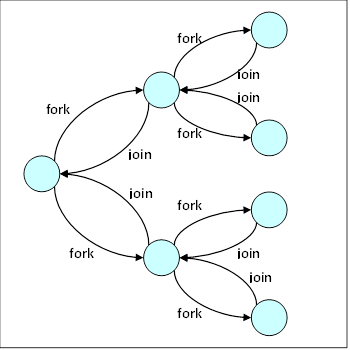Java7 ForkJoin入门实例源码教程。Java7引入了Fork Join的概念,来更好的支持并行运算。顾名思义,Fork Join类似与流程语言的分支,合并的概念。也就是说Java7 SE原生支持了在一个主线程中开辟多个分支线程,并且根据分支线程的逻辑来等待(或者不等待)汇集,当然你也可以fork的某一个分支线程中再开辟Fork Join,这也就可以实现Fork Join的嵌套。
有两个核心类ForkJoinPool和ForkJoinTask。
ForkJoinPool实现了ExecutorService接口,起到线程池的作用。所以他的用法和Executor框架的使用时一样的,当然Fork Join本身就是Executor框架的扩展。ForkJoinPool有3个关键的方法,来启动线程,execute(…),invoke(…),submit(…)。具体描述如下:
| 客户端非fork/join调用 | 内部调用fork/join | |
| 异步执行 | execute(ForkJoinTask) | ForkJoinTask.fork |
| 等待获取结果 | invoke(ForkJoinTask) | ForkJoinTask.invoke |
| 执行,获取Futrue | submit(ForkJoinTask) | ForkJoinTask.fork(ForkJoinTasks are Futures) |
ForkJoinTask是分支合并的执行任何,分支合并的业务逻辑使用者可以再继承了这个抽先类之后,在抽象方法exec()中实现。其中exec()的返回结果和ForkJoinPool的执行调用方(execute(…),invoke(…),submit(…)),共同决定着线程是否阻塞,具体请看下面的测试用例。
首先,用户需要创建一个自己的ForkJoinTask。代码如下:
|
1
2
3
4
5
6
7
8
9
10
11
12
13
14
15
16
17
18
19
20
21
22
23
24
25
26
27
28
29
30
31
32
33
34
35
36
|
public class MyForkJoinTask extends ForkJoinTask { /** * */ private static final long serialVersionUID = 1L; private V value; private boolean success = false; @Override public V getRawResult() { return value; } @Override protected void setRawResult(V value) { this.value = value; } @Override protected boolean exec() { System.out.println("exec"); return this.success; } public boolean isSuccess() { return success; } public void setSuccess(boolean isSuccess) { this.success = isSuccess; }} |
测试ForkJoinPool.invoke(…):
|
1
2
3
4
5
6
7
8
9
10
11
12
13
14
15
16
17
18
19
20
21
22
23
24
25
26
27
28
29
30
31
32
33
34
35
36
37
38
39
|
@Test public void testForkJoinInvoke() throws InterruptedException, ExecutionException { ForkJoinPool forkJoinPool = new ForkJoinPool(); MyForkJoinTask task = new MyForkJoinTask(); task.setSuccess(true); task.setRawResult("test"); String invokeResult = forkJoinPool.invoke(task); assertEquals(invokeResult, "test"); } @Test public void testForkJoinInvoke2() throws InterruptedException, ExecutionException { final ForkJoinPool forkJoinPool = new ForkJoinPool(); final MyForkJoinTask task = new MyForkJoinTask(); new Thread(new Runnable() { public void run() { try { Thread.sleep(1000); } catch (InterruptedException e) { } task.complete("test"); } }).start(); // exec()返回值是false,此处阻塞,直到另一个线程调用了task.complete(...) String result = forkJoinPool.invoke(task); System.out.println(result); } @Test public void testForkJoinSubmit() throws InterruptedException, ExecutionException { final ForkJoinPool forkJoinPool = new ForkJoinPool(); final MyForkJoinTask task = new MyForkJoinTask(); task.setSuccess(true); // 是否在此任务运行完毕后结束阻塞 ForkJoinTask result = forkJoinPool.submit(task); result.get(); // 如果exec()返回值是false,在此处会阻塞,直到调用complete } |
测试ForkJoinPool.submit(…):
|
1
2
3
4
5
6
7
8
9
10
11
12
13
14
15
16
17
18
19
20
21
22
23
24
25
26
27
28
29
30
31
32
33
34
35
36
37
38
39
|
@Test public void testForkJoinSubmit() throws InterruptedException, ExecutionException { final ForkJoinPool forkJoinPool = new ForkJoinPool(); final MyForkJoinTask task = new MyForkJoinTask(); task.setSuccess(true); // 是否在此任务运行完毕后结束阻塞 ForkJoinTask result = forkJoinPool.submit(task); result.get(); // 如果exec()返回值是false,在此处会阻塞,直到调用complete } @Test public void testForkJoinSubmit2() throws InterruptedException, ExecutionException { final ForkJoinPool forkJoinPool = new ForkJoinPool(); final MyForkJoinTask task = new MyForkJoinTask(); forkJoinPool.submit(task); Thread.sleep(1000); } @Test public void testForkJoinSubmit3() throws InterruptedException, ExecutionException { final ForkJoinPool forkJoinPool = new ForkJoinPool(); final MyForkJoinTask task = new MyForkJoinTask(); new Thread(new Runnable() { public void run() { try { Thread.sleep(1000); } catch (InterruptedException e) { } task.complete("test"); } }).start(); ForkJoinTask result = forkJoinPool.submit(task); // exec()返回值是false,此处阻塞,直到另一个线程调用了task.complete(...) result.get(); Thread.sleep(1000); } |
测试ForkJoinPool.execute(…):
|
1
2
3
4
5
6
|
@Test public void testForkJoinExecute() throws InterruptedException, ExecutionException { ForkJoinPool forkJoinPool = new ForkJoinPool(); MyForkJoinTask task = new MyForkJoinTask(); forkJoinPool.execute(task); // 异步执行,无视task.exec()返回值。 } |
在实际情况中,很多时候我们都需要面对经典的“分治”问题。要解决这类问题,主要任务通常被分解为多个任务块(分解阶段),其后每一小块任务被独立并行计算。一旦计算任务完成,每一快的结果会被合并或者解决(解决阶段)。ForkJoinTask天然就是为了支持“分治”问题的。
分支/合并的完整过程如下:

下面列举一个分治算法的实例。
|
1
2
3
4
5
6
7
8
9
10
11
12
13
14
15
16
17
18
19
20
21
22
23
24
25
26
27
28
29
30
31
32
33
34
35
36
37
38
39
40
41
42
43
44
45
46
47
48
49
50
51
52
53
54
55
56
57
58
59
60
61
|
import java.util.Random;import java.util.concurrent.ForkJoinPool;import java.util.concurrent.RecursiveTask;public class MaximumFinder extends RecursiveTask<Integer> { private static final int SEQUENTIAL_THRESHOLD = 5; private final int[] data; private final int start; private final int end; public MaximumFinder(int[] data, int start, int end) { this.data = data; this.start = start; this.end = end; } public MaximumFinder(int[] data) { this(data, 0, data.length); } @Override protected Integer compute() { final int length = end - start; if (length < SEQUENTIAL_THRESHOLD) { return computeDirectly(); } final int split = length / 2; final MaximumFinder left = new MaximumFinder(data, start, start + split); left.fork(); final MaximumFinder right = new MaximumFinder(data, start + split, end); return Math.max(right.compute(), left.join()); } private Integer computeDirectly() { System.out.println(Thread.currentThread() + ' computing: ' + start + ' to ' + end); int max = Integer.MIN_VALUE; for (int i = start; i < end; i++) { if (data[i] > max) { max = data[i]; } } return max; } public static void main(String[] args) { // create a random data set final int[] data = new int[1000]; final Random random = new Random(); for (int i = 0; i < data.length; i++) { data[i] = random.nextInt(100); } // submit the task to the pool final ForkJoinPool pool = new ForkJoinPool(4); final MaximumFinder finder = new MaximumFinder(data); System.out.println(pool.invoke(finder)); }} |